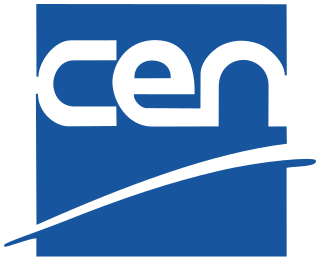An international standard is a technical standard developed by one or more international standards organizations. International standards are available for consideration and use worldwide. The most prominent such organization is the International Organization for Standardization (ISO). Other prominent international standards organizations including the International Telecommunication Union (ITU) and the International Electrotechnical Commission (IEC). Together, these three organizations have formed the World Standards Cooperation alliance.
A standards organization, standards body, standards developing organization (SDO), or standards setting organization (SSO) is an organization whose primary function is developing, coordinating, promulgating, revising, amending, reissuing, interpreting, or otherwise contributing to the usefulness of technical standards to those who employ them. Such an organization works to create uniformity across producers, consumers, government agencies, and other relevant parties regarding terminology, product specifications, protocols, and more. Its goals could include ensuring that Company A's external hard drive works on Company B's computer, an individual's blood pressure measures the same with Company C's sphygmomanometer as it does with Company D's, or that all shirts that should not be ironed have the same icon on the label.

The European Committee for Standardization is a public standards organization whose mission is to foster the economy of the European Single Market and the wider European continent in global trading, the welfare of European citizens and the environment by providing an efficient infrastructure to interested parties for the development, maintenance and distribution of coherent sets of standards and specifications.

Price look-up codes, commonly called PLU codes, PLU numbers, PLUs, produce codes, or produce labels, are a system of numbers that uniquely identify bulk produce sold in grocery stores and supermarkets. The codes have been in use since 1990, and over 1400 have been assigned. The codes are administered by the International Federation for Produce Standards (IFPS), a global coalition of fruit and vegetable associations that was formed in 2001 to introduce PLU numbers globally.

FTD LLC also known as Florists' Transworld Delivery, is a floral wire service, retailer, and wholesaler based in Downers Grove, Illinois, in the United States. FTD was founded as Florists' Telegraph Delivery in 1910, to help customers send flowers remotely on the same day by using florists in the FTD network who are near the intended recipient. It was based in Detroit, Michigan and then moved to Southfield, Michigan prior to its move to Downers Grove. It originated as a retailers' cooperative and began a process of demutualization in 1994. It operates two main businesses: The Consumer Business sells flowers and gift items through its websites and The Floral Business sells computer services, software and even fresh cut flowers to FTD and Interflora affiliated florists.
The American Gaming Association (AGA) is a United States gambling industry association. It was founded in 1994 with the goal of promoting, educating and lobbying on behalf of the gambling industry. The AGA's offices are located in Washington, D.C.

World Nuclear Association is the international organization that promotes nuclear power and supports the companies that comprise the global nuclear industry. Its members come from all parts of the nuclear fuel cycle, including uranium mining, uranium conversion, uranium enrichment, nuclear fuel fabrication, plant manufacture, transport, and the disposal of used nuclear fuel, as well as electricity generation itself.

The American Meat Institute (AMI) was the oldest and largest trade association representing the U.S. meat and poultry industry. In 2015, it was merged into the North American Meat Institute (NAMI).

The floral industry is focused on the production, distribution and sale of flowers for human enjoyment. The industry continues to diversify from the production of cut flowers to the production and sale of plants and flowers in many different forms. The global floral industry market size is estimated to be worth US$ 50040 million in 2022 and is forecast to increase to US$ 58030 million by 2028 with a compound annual growth rate of 2.5% during the review period.
Title 7 of the United States Code outlines the role of agriculture in the United States Code.

The International Council of Shopping Centers, doing business as ICSC, is the global trade association of what it calls the "Marketplaces Industry". Founded in 1957, it features more than 70,000 members in over 100 countries, including shopping center owners, developers, managers, marketing specialists, investors, retailers and brokers, as well as academics and public officials. As the global industry trade association, ICSC links with more than 25 national and regional shopping center councils throughout the world.
A technical standard is an established norm or requirement for a repeatable technical task which is applied to a common and repeated use of rules, conditions, guidelines or characteristics for products or related processes and production methods, and related management systems practices. A technical standard includes definition of terms; classification of components; delineation of procedures; specification of dimensions, materials, performance, designs, or operations; measurement of quality and quantity in describing materials, processes, products, systems, services, or practices; test methods and sampling procedures; or descriptions of fit and measurements of size or strength.
The Modification and Replacement Parts Association is the Washington, D.C.-based trade association that represents manufacturers of government-approved aftermarket aircraft parts. These aircraft parts are often known as PMA parts, from the acronym for Parts Manufacturer Approval. The manufacture of PMA parts is regulated in the United States by the Federal Aviation Administration.
The World Apple and Pear Association (WAPA) is a trade association established in 2001 representing major apple and pear producing countries globally. The Association provides a forum for member discussion and reviews market information related to fruit trees. In 2007, world apple production reached 66 million tonnes while pear production amounted to 20.5 million tonnes. The secretariat of the association is located in Brussels.
Produce traceability makes it possible to track produce from its point of origin to a retail location where it is purchased by consumers.
Interface:2010 is The Interface Marketing Supplier Integration Institute, widely known as INTERFACE and IMSI, is an international-standard-setting body composed of representatives from various national marketing and supply chain management organizations. Founded on 11 March 2009, the organization promulgates worldwide proprietary marketing supplier integration standards. It is headquartered in Geneva, Switzerland. While IMSI defines itself as a non-governmental organization, its ability to improve the marketing supply chain, reduce costs and eliminate risk makes the IMSI highly influential within the government sector.
Fairtrade bananas was a marketing initiative which focused on increasing the price paid to small banana growers and the wages of agricultural workers. This is not a commercial brand, but a marketing strategy. Fair trade is based on higher prices paid by consumers that allow an equitable distribution of gains from trade over the chain partners.
Public Relations Consultants Association of India (PRCAI) is a trade organization that represents India's public relations consultancy sector. It is the summit body for official communications and public relations practices in India. It was formed in October 2001 to grow, represent, and support India's public relations consultancy sector in international practices. It also provides a forum for government, public bodies, industry associations, trade, and others to confer with public relations consultants as a body. It is an internationally recognized organization that offers official membership to all PR practitioners who abide by the basic criteria devised by the association.

The Biotechnology Innovation Organization (BIO) is the largest advocacy association in the world representing the biotechnology industry. It was founded in 1993 as the Biotechnology Industry Organization from a merger of the Industrial Biotechnology Association (IBA) and the Association of Biotechnology Companies (ABC), and changed its name to the Biotechnology Innovation Organization on January 4, 2016. Biotechnology Innovation Organization serves more than 1,100 biotechnology firms, research schools, state biotechnology centers and related associations in the United States and in more than 30 other countries.
The Society of American Florists (SAF) is a national US trade association representing floristry in the United States (US). Retailer's, grower's, wholesaler's, importer's, manufacturer's, suppliers, educator's, student's, and allied organization's are member's.







